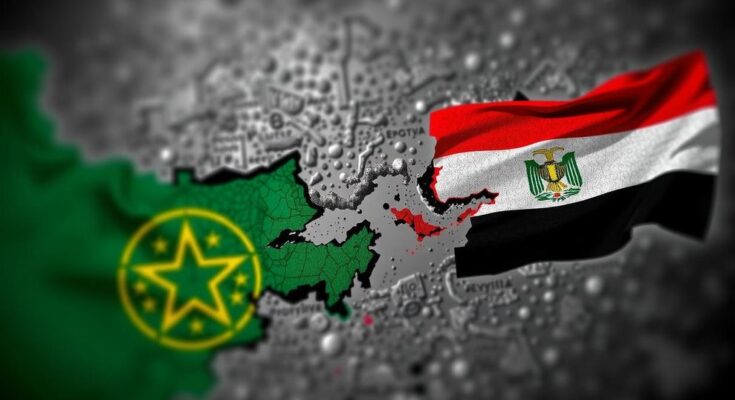The defense agreement between Somalia and Egypt can destabilize regional security by undermining Ethiopia’s role in combating al-Shabaab. Growing tensions between these nations threaten to create a power vacuum that could be exploited by extremists. Effective diplomatic intervention from international stakeholders like the EU is critical to maintaining stability in Somalia and preventing al-Shabaab’s resurgence.
The recent defense agreement between Somalia and Egypt poses significant challenges to regional stability, especially regarding the ongoing threat from al-Shabaab, an extremist group intent on overthrowing the Somali government. This pact has exacerbated tensions with Ethiopia, a critical player in the fight against the jihadist threat and a major contributor to the African Union mission in Somalia. If these geopolitical tensions are not addressed, they could increase the operational space for al-Shabaab, threatening both Somalia and the broader Horn of Africa region. On Sunday, a mortar attack at a military base in Mogadishu, which hosts officials from international organizations, resulted in casualties and highlighted the increasing audacity of al-Shabaab. Though there has been some military progress against the group, it continues to maintain control over significant territories in central and southern Somalia. The political discord between federal and state governments coupled with a fractured anti-al-Shabaab coalition threatens to create a security vacuum which al-Shabaab is poised to exploit. The defense pact between Somalia and Egypt could further complicate the security landscape in Somalia, as it may undermine cooperation with Ethiopia, whose troops are essential for defeating al-Shabaab. Ethiopian forces, numbering between 8,000-10,000, are integral not only for securing Somalia but also to safeguard Ethiopia’s own borders from attacks. As relations sour between Egypt and Ethiopia over issues like the Grand Ethiopian Renaissance Dam, Somalia’s alignment with Egypt could destabilize the already precarious military cooperation vital for countering terrorism. Egypt’s intention to send troops to Somalia, as part of the defense pact, raises concerns about the feasibility and potential implications of such a deployment. Historically, Egypt has refrained from military interventions abroad, and its financial constraints further complicate this situation. The African Union is unlikely to endorse a plan that undermines Ethiopian interests, which could result in a frozen security situation in Somalia if this partnership develops without a cohesive strategy. Moreover, Somalia’s state-building process is fraught with challenges as divisions between federal authorities and individual states deepen. Resistance among local leaders to the implications of the defense pact highlights the tensions that could arise, particularly as key regions depend on Ethiopian military support for stability. Should either Ethiopian or Egyptian forces engage with opposing Somali factions, the potential for conflict within Somalia could increase exponentially, further handing al-Shabaab the upper hand. Therefore, the current situation necessitates proactive engagement from international actors, particularly the European Union, which has invested substantially in Somalia’s security operations. The EU’s historical commitment and involvement present an opportunity to facilitate diplomatic channels aimed at reconciling tensions between Somalia, Egypt, and Ethiopia. By working alongside key stakeholders like Turkey and the UAE—who possess significant influence in the region—a coordinated effort could mitigate the risks surrounding the defense pact and support the stability of Somalia’s political landscape. It is vital for European leaders to leverage their funding and diplomatic power to augment regional mediation efforts so as to foster a collaborative approach against al-Shabaab. The looming expiration of the African Union mission’s mandate brings urgency to this matter. Therefore, immediate action is imperative to avert a resurgence of al-Shabaab, bolster regional security, and maintain the integrity of vital maritime routes.| The threats associated with al-Shabaab, along with possible spillover effects affecting neighboring nations, underline the importance of a cohesive response from international stakeholders. Failure to act decisively could lead to a deterioration of the security situation in Somalia, inviting further instability across the Horn of Africa and beyond.
The tensions among Somalia, Egypt, and Ethiopia are rooted in complex geopolitical issues and the ongoing conflict with al-Shabaab, an extremist group that poses a significant threat to security in the region. Since 2007, African Union peacekeeping missions have been crucial in combatting this group, yet recent alliances, particularly Somalia’s defense pact with Egypt, threaten to destabilize the situation further. As Ethiopia plays a pivotal role in the current security framework through its contributions to the AU mission, the implications of deteriorating relations can lead to adverse effects not only for Somalia but also in the wider Horn of Africa.
In summary, the defense pact between Somalia and Egypt presents serious implications for regional security, particularly concerning the fight against al-Shabaab. The potential sidelining of Ethiopian military support and the resultant political fragmentation within Somalia could create a permissive environment for terrorist activities. The European Union and its partners must act swiftly to mediate these tensions and ensure cohesive military and political frameworks to combat the rising threat of extremism in the region.
Original Source: ecfr.eu




